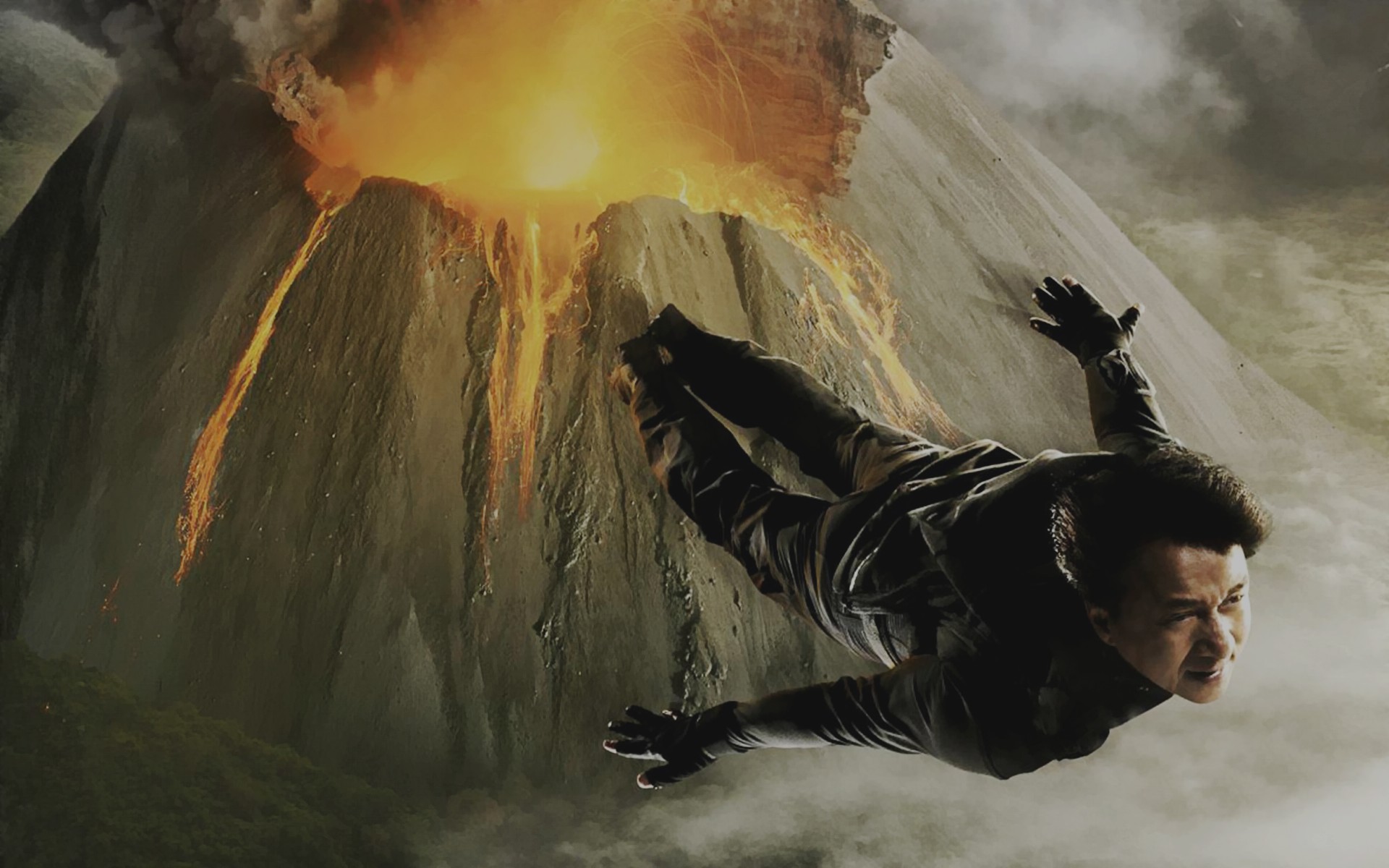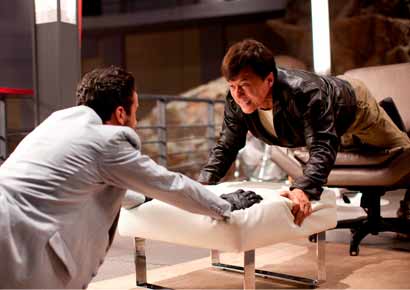Filtered By: Lifestyle
Lifestyle
Movie review: Jackie Chan's 'CZ12' is the end of an era
By Mikhail Lecaros
Jackie Chan movies have never been paragons of narrative construction, much less exercises in thespian aptitude. Their main attraction, their raison d'être has, was, and always will be the man himself.
Forget plot, forget acting. For over 30 years, it’s been Chan’s unique blend of action, humor and death-defying stunts (self-performed, of course) that has enthralled viewers the world over.
Breaking into the scene in the 1970s as part of an endless stream of pre-packaged Bruce Lee clones (to the point of appearing in an official sequel to “Fist of Fury” as Lee’s brother) in a series of failed films, Chan found success by repositioning himself as a kung-fu comedian. His first releases under this new direction, “Snake in the Eagle’s Shadow” and “Drunken Master”, broke box office records.
Beyond the kung-fu clown
If kung-fu clown had been all Chan aspired to, he would have been set for life, but the young star aimed higher. Burned by early Golden Harvest attempts to export him to America (in the truly awful “Battle Creek Brawl” and “The Protector”, as well as an extended cameo in “The Cannonball Run”), Chan returned to Hong Kong with a renewed drive to prove himself.
Where Chan couldn’t outdo Hollywood in budgets or explosions, he would work with the resources he had at hand: a lifetime of martial arts, acrobatics, gymnastics, dance, and theater training, tempered by a sense of discipline drilled into him over ten years as a student and performer at Hong Kong’s Peking Opera School.
It made sense; as audience tastes shifted from traditional Chinese theater to the cinema, martial arts masters and students alike were being forced to eke out their living as stuntmen and fight choreographers.
These skills would prove to be the perfect complement to Chan’s growing passion for filmmaking. On the road to stardom, he had developed an affinity for old-school Hollywood cinema, taking in as many classics as he could squeeze in between stunt jobs and bit film roles. From the silent greats, Chan imbibed Charlie Chaplin’s ability to tell stories through body language and the visceral thrill of experiencing the nerve-shredding derring-do that drove Harold Lloyd and Buster Keaton to perform their own stunts.

Even the CGI-assisted skydiving sequence lacks logic or entertainment value.
From the Technicolor musicals, he grew to admire Fred Astaire’s effortless grace and Gene Kelly’s inexhaustible energy that enabled them to perform complex dance sequences in long, sweeping takes.
When the first trailers for “Chinese Zodiac” (abbreviated in promo materials to “CZ12”), were released, the footage shown looked to be a return to form for the now-58 year old star.
Billed as his 101st film, “Chinese Zodiac” is the second sequel to 1987’s “Armor of God”. Presented as Chan’s last foray into high-octane action (in order to concentrate, ostensibly, on less life-threatening fare), it is with my deep regret to report that the film is a convoluted mess that never lives up to its promise.
The age of Chan, action hero
We'll get back to that in a moment. Back in the 80s, while his peers (and the rest of the world) were busy trying to figure out ways to get in on the special effects blockbuster age that “Jaws” and “Star Wars” had kick-started, Chan was taking notes on how to shoot and edit complicated choreography in as clean a manner as possible from the likes of “West Side Story” and “The Sound of Music.”
The hard work and research would pay off, and the 1980’s were Chan’s most prolific. With all the ingredients in place, the age of Jackie Chan: Action Icon had officially begun.
One of the earliest highlights of this period was 1983’s “Project A”, a period piece and direct answer to “Battle Creek Brawl’s” shortcomings. With a zany plot that took place in turn-of-the-century Hong Kong, the film was fast, hard-hitting, and featured the centerpiece stunt of its star falling from a four-story clock tower (an echo of Harold Lloyd’s “Safety Last”) through a series of awnings to the hard ground below. It was at this point that Chan began incorporating bloopers that played over the end credits, a trick he learned from “The Cannonball Run”.
1985’s “Police Story” (itself a direct answer to “The Protector”) would be the standard by which all Chan’s future efforts would be judged. Bigger and better in every way, Chan’s perfectionist streak was in full evidence, with the star serving as director, producer, writer, choreographer, stuntman, and actor, in addition to writing and performing the title theme song.
Broken bones all the way to Hollywood
So many sets were destroyed and bones broken that stuntmen were going from the shoot to the hospital and back again on a near-daily basis. The highlight this time was Chan’s slide down a 75-foot vertical metal pole covered in light bulbs (every one of which he shattered on his way down) burning the skin off his hands and injuring Chan with medical science’s first known case of a dislocated pelvis.
90’s efforts “Drunken Master II”, “Police Story 3: Supercop” and “Rumble in the Bronx” drew enough positive notices in the West for Hollywood to come calling again, a call he answered with 1998’s surprise hit, “Rush Hour”.
The 2000’s, however, were not kind to Chan. Having discovered, the hard way, that what might entertain an international audience may not necessarily be what entertains an American one, his new direction was to shoot different films for different markets resulting in a clear-cut case of spreading oneself too thin.
In addition, despite some effort being made to acknowledge Chan’s advancing age in his Asian releases, most notably in “New Police Story”, “The Shinjuku Incident” and “Little Big Soldier”, his American films were trite, pandering affairs that American audiences – having arrived late to the table – by now associated with him.

The film's only decent fight scene comes too little, too late, into the overblown running time.
This is how the fight ends
Chan earned two Guinness World Records for “CZ12”: "Most Stunts Performed by a Living Actor" and "Most Credits in One Movie", and it opens promisingly enough, with a re-enactment of the colonial plundering of the Summer Palace, culminating in the theft of 12 bronze heads, each representing an animal of the Chinese zodiac.
The film then cuts to the present day, which finds Chan as the same maverick relic hunter from the previous films, here named “JC”, as opposed to his former “Armor of God” nicknames of Asian Hawk and Asian Condor. Still addicted to chewing gum and up to his old tricks, JC is tasked by a billionaire counterfeiter (Oliver Platt, clearly slumming) to recover the heads with the intention of putting them up for international auction.
What follows is a globetrotting trip with an international cast that spends most of their scenes acting like total and complete fools.
Chan tries his game best, but the sophomoric, often-racist material he’s pushing here comes across as a tired attempt of a fading star trying to reclaim past glories, rather than any effort at presenting something new.
There is only one actual decent, un-CGI assisted fight sequence in the film, which begins one-on-one then escalates into a free-for-all brawl throughout a factory, but one has to slog through over 90 minutes of overwrought patriotic speeches and slapstick from nearly everyone involved to get to that point.
Then, just when things are looking up, we are forced to endure a tacked-on skydiving “action” sequence, where mostly-digital doubles are substituted for actual characters, effectively killing whatever enthusiasm the audience may have had left.
Last-minute cameos from the likes of Daniel Wu and Jackie’s real-life wife are crammed into the last five minutes in a last-ditch effort to entertain. It is too little, too late.
Over the end credits, Chan gives a speech to his fans, thanking them for their support over the years. While the prerequisite bloopers and Chan-sung theme are present, one can’t shake the feeling that the man’s best days are long behind him.
Curiously, halfway through, excerpts of Chan’s themes from older, better films begin to play, bringing to bear the all-too-painful possibility that, at some point during production, somebody must have been thinking the same thing. – KDM, GMA News
“Chinese Zodiac” is currently screening in cinemas nationwide.
Photos courtesy of Jackie and JJ Productions LTD.
Mikhail Lecaros is a professional magazine editor and freelance writer. The views expressed in this article are solely his own.
More Videos
Most Popular



